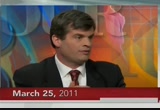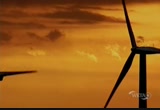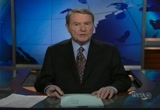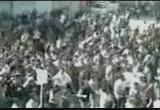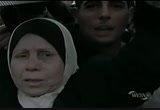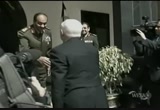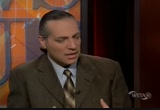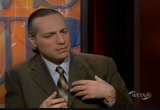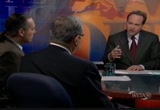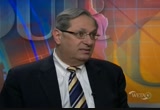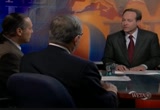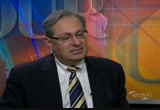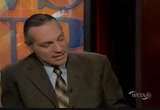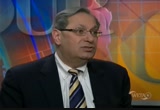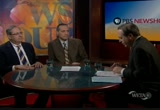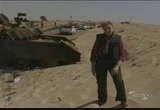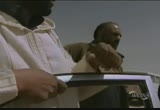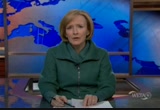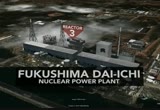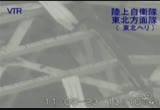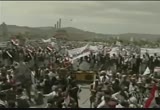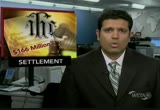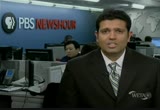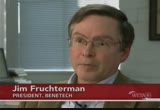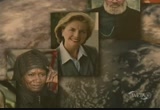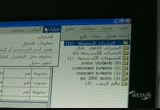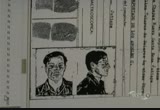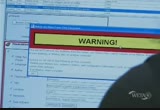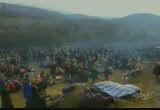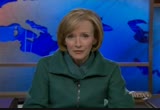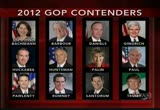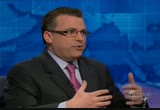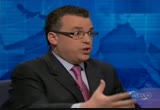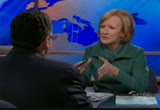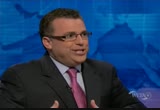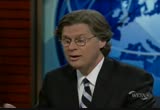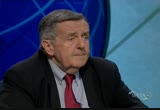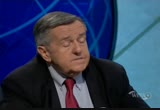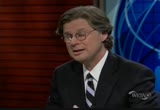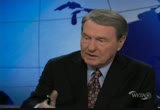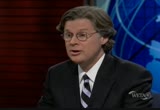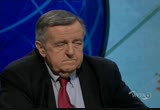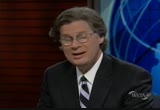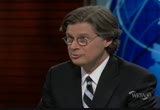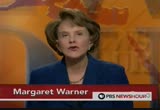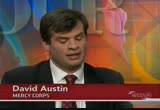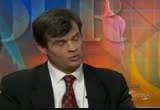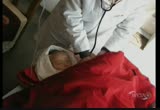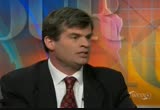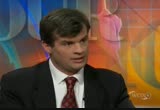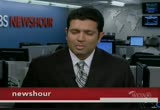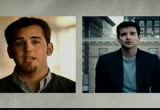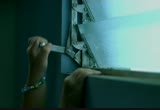tv PBS News Hour PBS March 25, 2011 7:00pm-8:00pm EDT
7:00 pm
captioning sponsored by macneil/lehrer productions >> lehrer: government troops opened fire on protesters in syria today as thousands of syrians took to the streets in several cities. good evening. i'm jim lehrer. >> woodruff: and i'm judy woodruff. on the newshour tonight, we have the latest on today's clashes, the most widespread unrest in the arab nation in years. >> lehrer: then, we update the conflict in libya, where coalition planes are helping rebels in the battle for a key eastern town. >> woodruff: spencer michels has the story of a high-tech company documenting patterns of brutality around the world. >> could we make tools to make the human rights movement more
7:01 pm
powerful by helping them do more with the information they have about human rights abuses? >> lehrer: newshour political editor david chalian goes through the list of republicans preparing to run for president in 2012. >> woodruff: we get analysis of this week's news from mark shields and byron york, filling in for david brooks. >> lehrer: and margaret warner explores the looming food crisis in north korea. >> they're typically in a chronic situation where they can barely feed their own population, so a big shock like losing half their winter wheat or their barley crops is going to affect their population. >> lehrer: that's all ahead on tonight's newshour. major funding for the pbs newshour has been prided by: >> okay, listen. somebody has got to get serious. >> i think... >> we need renewable energy. >> ...renewable energy is vital to our planet. >> you hear about alternatives, right? wind, solar, algae. >> i think it's got to work on a big scale. and i think it's got to be affordable.
7:02 pm
>> so, where are they? >> it has to work in the real world. at chevron, we're investing millions in solar and biofuel technologies to make it work. >> we've got to get on this now. >> right now. ♪ ♪ moving our economy for 160 years. bnsf, the engine that connects us. b pacific life-- the power to help you succeed. and by toyota. the william and flora hewlett foundation, working to solve
7:03 pm
social and environmental problems at home and around the world. and with the ongoing support of these institutions and foundations. and... this program was made possible by the corporation for public broadcasting. and by contributions to your pbs station from viewers like you. thank you. >> lehrer: syria was gripped today by a sweeping display of opposition. it brought a deadly response. jeffrey brown has that story. >> brown: the syrian government declared today, "the situation is completely calm in all parts of the country." but amateur video from around the country posted on youtube and elsewhere told a very different story-- even, tonight, in a damascus bazaar. altogether, it marked a major escalation in the unrest, and the strongest challenge to the syrian regime in years.
7:04 pm
cell phone images from the city of daraa captured scenes of chaos as protesters ducked behind walls to escape being shot by soldiers. the protests in daraa had been growing for a week, and troops started shooting today after crowds set fire to a statue of the late president hafez assad. witnesses reported at least two people were killed, and many wounded. earlier, up to 50,000 people, according to one witness, had flooded the city's main square, chanting "freedom" and waving syrian flags. video had already emerged from daraa showing bodies at a gas station, and people running for cover under heavy gunfire from government forces. elsewhere, smoke billowed into the sky over demonstrators in the coastal city of latakia. security forces opened fire there, too, and activists reported four people killed. thousands more took to the streets in the central city of hama, raising fists in the air
7:05 pm
and chanting "freedom." the protests in hama came nearly 30 years after the syrian army crushed a rebellion there by the muslim brotherhood, killing up to 40,000 people there. in turn, supporters of president bashar assad flooded streets in damascus today near the mosque, standing atop cars, carrying posters of assad and shouting, "only god, syria and bashar." >> brown: in a bid to defuse tensions, assad, who took power 11 years ago after his father's death, has moved to increase wages for state workers. and the government promised yesterday to consider lifting the state of emergency in effect since 1963, with its restrictions on political freedom. but in washington today, white
7:06 pm
house press secretary jay carney condemned the regime's use of force. >> we urge upon the syrian government that they pursue a non-violent path, that they pursue political dialogue, because the future of this region depends upon... the stability and future of this region depends upon the decision by governments to listen to their people. >> brown: yesterday, defense secretary robert gates said that the syrian army should take a lesson from how the army in egypt refused to attack its own people. meanwhile, a leading syrian opposition figure called today for the international community to intervene to "stop the massacres." more now, from theodore kattouf. he served as u.s. ambassador to he served as u.s. ambassador to syria from 2001 to 2003, part of a 31-year career in the foreign service, most of it in the middle east. and ammar abdulhamid is a liberal democracy activist whose anti-regime activities led to his exile from syria in 2005. he now lives in the u.s. and
7:07 pm
writes the blog "syria revolution digest." welcome to both of you. the reports are, ammar is that this started with the arrest of some teenagers in the town, some anti-regime graffiti. it has clearly group. how has it group, what is involved now. >> what you have to realize is the seeds of this revolution has been planted years ago. what you are talking about syria with the arrest of the children, we are talking about the immediate cause. but people got an idea that the times were suitable for a revolution, finally, when of course tunisia was made and managed to topple their regime and egyptians and we saw immediately how the spark really, or the wave of protests took ever o the region. a lot of said finally. our time is now, seems to be. and the people without said so were actually teenagers and young people in their 20s who were inside syria
7:08 pm
and went to facebook to other social networking sites and began chatting with dissidents inside the country and outside the countrieses. and they said okay, i mean, we're willing to listen now. we understand that we can do it so what can we do. and but they took the leadership. i mean the discussion was about about taxes, about messages, they should be very careful to he announce yate. i thought for a while that it would be better to actually push the date of the revolution a little bit until the summer because we needed more time to communicate with different groups within-- . but i was outvoted. >> brown: ambassador ted kattouf what has it group into, what are they calling for, how much are they calling tore change. >> well, it is has group in the surrounding village. in one village today people tried to march and reports were 15 of them were kildz, into an anti-regime movement
7:09 pm
there. these people originally came out demanding the release of these young kids can who spray-painted graffiti, copying perhaps what happened in egypt and the like and were treated obviously very brutally by the police there. and that's what sparked all of this. but now there are martyrss being created every day and the regime has just been incredibly clumsy and it's a pauling the violence. >> brown: now fill in a little bit the picture of this regime for those, we don't follow it all the time. this is the saasd regime has been known for a very tight author tearian group for a long time. but the son, bashar has at least given an image of trying to open telephone up a little bit in recent years, no? >> that's right. the father ruled for 30 years as the unquestioned president of syria. he put down a muslim brotherhood campaign against
7:10 pm
them. and on campaign, by the way, brutally in 1982 but it was effective and everybody got the message, you don't do this. you don't question the regime. as longs as you don't get involved in politics, you will be fine. just go along. the son came in and june of 2000 and started right away to suggest that theres was going to be major reforms done. and i think some of the old guard must have gotten to him and said look, this system doesn't run that way. doesn't work this way. and he -- >> i have a slightly different perspective of how sort of bashar act. i think in the beginning, the reason there was so muc much-- little openness, actually n comparison to the previous era was because he was still trying to find his footing. i mean he was still young. he was not necessarily completely accepted by the old guard. he didn't know how to run a country to begin with. i mean he wasn't really well
7:11 pm
prepared for -- >> he worked with his father for seven years. >> it didn't seem to have given him a lot of indication of how to do it because we have seen a lot of-- you have seen how clumsy he was in the first few years. that allowed for the openness. so the openness wasn't because of his decision or reform intentions. it is was because he really didn't know how to control society and there was some competition with that. >> because now you see him responding with a mix of one day putting out some possible reforms including getting rid of the emergency law. but also a very clearly very heavy hand of violence here. is this-- is this the response would you expect. is this him still trying to figure out how much support he has from within the society. >> well, it's very interesting. a spokesperson-- shaban was on a press conference yesterday in which he said she heard the president order the security chiefs not to use violence. this is after 34 people by their count were dead.
7:12 pm
now this is a man who has been president for 11 years. he's had time to move the old guard out and put his people in place and the lacking security serviceses in the military it sounds like he's trying to play the role of a monarch and put himself above the fray and i'm not really responsible for this. but he's at a crossroads. an eye doctor, a guy who studied to save people's eyesight, without did a residency in london, who married a very educated and sophisticated woman of syrian ethnicity but u.k. citizenship has to decide is he going to give in and go totally to the dark side, the sdrairteder sort of option-- darth vader sort of option or take the risk and try to open up the system and stop this killing. >> brown: and what do you look for from the opposition in terms of its growth and its spread to know how successful it will be, whether it has the ability to either enforce reforms or perhaps get rid of the regime. >> well, i mean getting rid of the regime right now is
7:13 pm
on everybody's mind. to be honest, to ask bashar a saad he was a thug then, he is a thug now, he is a-- with the idea of reform, the idea of him being suddenly finding some kind of reform impulseses is impossible. >> i thought he was michael. >> he was never michael. he was never michael. michael tried to reform and i think this is exactly what people want. >> we will have a disagreement about-- . >> brown: the disagreement you have is over corleone. but seriously over the next couple of days here, is their key point. >> it is a key point it is going to happen right now. i think the opposition, both inside and outside the country realize this is a golden opportunity, that the street is finally moving and they are demanding. there were people calling saying the people want to topple the regime. we have heard it being said in many of the demonstrations. the people were coming out and bashar and naming his brother by name and calling them cowardses.
7:14 pm
the-- in many cities they were defaced, in damascus s so that's really indicates that finally this is an anti-regime, an anti-assad revolution. it's not simply about minor reforms. so what the spokeswoman of the regime said yesterday was about some concessions, this is too little, too late. and we've seen this scenario. >> brown: go ahead. >> this is an entrenched regime. i disagree with ammar in the sense that yes, there is a lot of people who want to see probably bashar and the regime go after 40 years, totally natural. there is too much of a gap in wealth. there is too little development in syria. there are terrible droughts. but at the same time there is a party called the ba'ath part and it is a patronage system and there are hundreds of thousands, maybe a couple million people that belong to the ba'ath party there are lots of prominent businesspeople. there are a lot of prominent people in the military, et cetera, who benefit from
7:15 pm
this regime. this regime is to the going to go down easily. >> brown: all right. >> that might be the case, by the way, just one point, but i want to point out something, many. people who actually came to the streets were members of the ba'ath party. i mean these young people in these areases are always members of the ba'ath party so they can benefit exactly from the patronage system and they came on to the street and demonstrated in protest. the party could be part of the solution and not only part of the problem. >> we will watch in the coming days for sure. ammar abdulhamid, ted kattouf, thank you very much. >> woodruff: in libya today, the struggle turned to a key city in the east. overnight, british and french warplanes blasted government forces outside ajdabiya. the attacks gave new hope to rebels hoping to break the siege of the city. we have a report from lindsey hilsum of independent television news. >> reporter: pausing to pray, libyan rebels on the front line. a few miles to the west, they're
7:16 pm
trying to take advantage of the british and french overnight bombing of colonel qaddafi's forces around ajdabiya. they watch for more air strikes. this could be their moment to push qaddafi's forces back. the fighting is going on down the road. colonel qaddafi's forces aren't giving up. the coalition air strikes give the rebels their best chance at retaking the town of ajdabiya. as one man said to me, "i used to dread the sound of airplanes. now, i love it." the ministry of defense released video of precision-guided brimstone missiles launched from tornadoes overnight. they were targeting the qaddafi forces defensive line around ajdabiya. the coalition don't want to bomb inside the town for fear of killing civilians. some who were leaving the town said last night's attack had an immediate impact. >> qaddafi's army starts to leave their place in the west
7:17 pm
side because... because the planes start to hit them. >> reporter: the air strikes have suddenly opened up corridors enabling people to flee. this family said they'd been trapped in ajdabiya for 25 days, running from house to house. only now can they get out. no water? >> no water. no lights. >> reporter: no lights? >> no lights. >> reporter: very difficult. >> ( speaking arabic ) >> reporter: "god," he said, "was their only hope." some told me that qaddafi's soldiers were taking off their uniforms but keeping their weapons. >> ( translated ): from yesterday until now, they're shooting indiscriminately. when someone comes to rescue the injured, they fire with snipers. that's what is happening in ajdabiya. >> reporter: the rebels have rockets and some heavy weapons, but they say they need more. the danger for them is that western politicians and publics may lose patience. success may depend on colonel qaddafi's troops deserting and
7:18 pm
his political support collapsing rather than any rebel advance. >> lehrer: late today, al- jazeera television reported rebel fighters had entered the eastern half of the city. in other developments, nato said it will take over enforcing the no-fly zone over libya by monday. and president obama spoke with u.s. congressional leaders about the operation. a spokesman said the president will update the public in the "very near future". >> woodruff: still to come on the newshour: tracking human rights abuses; the republican contenders; mark shields and byron york; and north korea's food crisis. but first, the other news of the day. here's hari sreenivasan. >> sreenivasan: japan's struggle to stabilize a damaged nuclear plant took a sharp turn for the worse today. officials warned one of the reactors might have been breached. the fears of a possible breach at the fukushima plant arose after an incident thursday. two workers walking behind this
7:19 pm
security tarp and wearing blue boots suffered radiation burns and had to be hospitalized. they had waded through contaminated water that got inside their protective clothing as they tried to make repairs. >> ( translated ): the radiation level of the water which affected the injured is 10,000 times higher than the usual level. >> sreenivasan: the problem was in unit number three, damaged in a hydrogen explosion on march 14. officials said temperature and pressure in the reactor core remained stable. but highly radioactive water also turned up in unit one, and crews found water in two other reactor units as well. the source of the water in those buildings was unclear. faced with the new danger, workers pulled back from parts of the plant. they had been trying for days to stop the fuel rods from overheating and leaking radiation. in a news conference, japan's prime minister, naoto kan, called the situation "grave". >> ( translated ): the current
7:20 pm
condition of fukushima nuclear power plant does not allow any optimism yet. we will do our utmost to prevent the situation from deteriorating further. >> sreenivasan: the government had already ordered people living within a 12-mile radius of the plant to evacuate last week. today, officials suggested voluntary evacuations for those within a 19-mile radius of the plant. but they insisted that staying indoors in that zone is still a safe option. in the meantime, there had been some progress in parts of the plant. yesterday, lighting was restored to the central control room at unit one for the first time since the earthquake and tsunami hit two weeks ago. the death toll in the japanese disaster passed 10,000 today, with more than 17,000 people still listed as missing. several hundred thousand survivors remained in schools, civic buildings and other shelters. up to one million people have fled escalating violence in the ivory coast. the u.n. reported the exodus today. it said the situation was "very close to a civil war".
7:21 pm
many of those leaving are from neighboring mali. today alone, a thousand people swarmed evacuation buses in abidjan, where the trouble is worst. followers of president laurent gbagbo have been attacking foreigners in ivory coast. he's defied world demands to step down after losing his re-election bid. in yemen, president ali abdullah saleh said today he's ready to step down, but only if he can leave his country in "safe hands". after weeks of protests against his rule, saleh made a rare public appearance before cheering supporters outside his palace in sanaa. >> reporter: on this great day, the friday of forgiveness, peace, security and stability. yes, to skoourt and stability, no to anarchy and vandalism. >> sreenivasan: on the other side of the capital city, even larger crowds rallied again, demanding saleh's ouster. and in jordan, protesters clashed with government
7:22 pm
supporters in amman. the violence drew in security forces, and one protester was killed. more than 100 others were injured. canada is headed for an election after opposition parties toppled the conservative government of prime minister stephen harper. today's no confidence vote triggered the country's fourth election in seven years, to be held in early may. harper warned an election would harm canada's fragile economic recovery. opposition parties charge he has mismanaged the economy and is overly secretive. the roman catholic order of the jesuits will pay $166 million to hundreds of native americans and native alaskans. the groups charged that jesuit priests in the pacific northwest sexually abused them over a period of decades. the settlement announced today is one of the largest yet in the church's long-running abuse scandal. the city of new york today marked the 100th anniversary of the fire that galvanized the u.s. labor movement. the fire at the triangle shirtwaist factory in 1911 killed 146 people.
7:23 pm
most were young immigrant women, and many jumped to their deaths trying to escape the flames. the fire was the worst industrial accident in the city's history. it led to key improvements in workplace and fire safety. on wall street, stocks finished the week on a high note. the dow jones industrial average gained 50 points to close at 12,220. the nasdaq rose six points to close at 2,743. for the week, both the dow and nasdaq gained more than 3%. those are some of the day's major stories. now, back to jim. >> lehrer: the turmoil in the middle east has many fall-outs. one is new attention on a high- tech tool being used to combat human rights abuses. newshour correspondent spencer michels reports. >> reporter: it's nearly impossible to get accurate numbers of the killed, wounded, missing and tortured in libya and elsewhere in the middle east. yet, in the months to come, those statistics may prove
7:24 pm
crucial to finding out what really happened and bringing to justice those responsible. half a world away, in palo alto, california, the non-profit benetech initiative has developed an easily downloadable software program to document atrocities, and keep that data out of the hands of dictators and strongmen. it's being used, for free, on the ground in the middle east and elsewhere, says c.e.o. jim fruchterman. >> right now, human rights groups are collecting data in libya. they're trying to figure out who may have been killed and dragged away, right? where are their graves? and yes, we are definitely on tap for helping people collect that information, you know, both real-time, and also for reconstructing what's happened. >> reporter: fruchterman is a former rocket scientist turned social entrepreneur, who began seven for-profit start-ups in silicon valley, most of which failed. that included a privately
7:25 pm
financed rocket he had designed, which blew up just off the launch pad. nine years ago, he quit the for- profit world when a digital reading program he created for the blind didn't make enough money for investors. he turned his idea, bookshare, into a non-profit digital library that allows the disabled to access, via braille or the spoken word, 95,000 digitized books. revenue from that, plus grants and donations, help support benetech's human rights work, especially the development of software that is being used to hold ruthless governments accountable around the world. >> i thought, "well, how could you protect a bunch of essentially peasants in a rural village?" and the first thought is, you know, what kind of high tech could you have? so i started thinking about what human rights groups do? well, all they do is process information. but no one writes software for them.
7:26 pm
so could we make tools to make the human rights movement more powerful by helping them do more with the information they have about human rights abuses? the beauty of this software is that it encrypts as soon as you hit the save button. >> reporter: benetech's software program, called martus, can be easily used in the field, even by non-technical personnel. they download the program on a laptop, and fill in the blanks to provide a database. it's all automatically encrypted, and stored in the cloud on remote servers away from prying eyes. the data is accessible only by a secret code. then, says patrick ball, chief scientist in the human rights program, his team helps analyze the data. >> we don't catch bad guys-- that's the job of prosecutors. but once prosecutors are building a case about a crime of policy-- not about who pulled the trigger, but who made the plans-- then, our statistical analysis provides a fundamental
7:27 pm
basis for the claim about policy, about a plan, about design, coordination and organization of mass violence. >> reporter: that was the case in guatemala, where benetech is playing a crucial role in helping local authorities make sense of an enormous secret archive of police documents found in an abandoned warehouse. human rights workers scanned a sampling of the 80 million documents, many of which provided direct evidence of people "disappeared" and killed during the country's bloody civil war in the '80s. and they usedenetech's software and statistical analysis to find patterns of brutality. >> more than 10% of those documents deal with human rights violations. last year, we were expert witnesses in the first trial as a result of that giant archive, and two police officers were convicted of disappearing a labor organizer 20 years before.
7:28 pm
>> reporter: benetech trainers, like vijaya tripathi, teach colleagues how to protect information when computers are in danger of being stolen by troops or police, in countries where brutal dictators are still in power. >> you can log into martus and you can use what we call the "panic button." there are two different buttons here. the first is "delete my data", and the second is "delete all data and remove martus". we call these the panic button because they are intended to be used only in a state of emergency, when you believe that paramilitaries are coming to your door. >> reporter: eric stover, who has uncovered human rights abuses around the world, directs the human rights center at the university of california at berkeley. he says high-tech tools like the ones benetech provides are revolutionizing the field, and are especially useful in areas of armed conflict. >> there's torture, there's abuse of prisoners, there's disappearance, there's movement
7:29 pm
of populations, sexual violence. and this ability with these new technologies to gather information, to map it, and to understand it and be able to produce that and take that evidence to international criminal courts is extremely valuable. >> reporter: that's exactly what happened in the trial of former serbian president slobodan milosovic, who was indicted for crimes against humanity committed in kosovo in the late '90s. stover recruited patrick ball to document and analyze why ethnic albanian kosovars were fleeing kosovo at a time nato was bombing serb troops. >> was the migration and mass killing in kosovo the product of nato's bombing, of the albanian guerrillas, or was it part of a systematic campaign by yugoslav forces? that's a critical question of fact which statistics help us answer in a pretty definitive way, and that changes history forever. >> reporter: ball's testimony before an international war
7:30 pm
crimes tribunal was used by prosecutors to prove the intent of ethnic cleansing. with the international criminal court now investigating possible crimes against humanity committed in libya, benetech believes its scientific analysis of data will be in high demand throughout the middle east. >> woodruff: after a somewhat muted start, the early stage of the contest for the 2012 republican presidential nomination has kicked into a higher gear, as the field of contenders has begun to take shape. the big move this week came from former minnesota governor tim pawlenty, who released a video on facebook announcing his formation of an exploratory committee. here's an excerpt.
7:31 pm
>> . >> at a young age i saw up close the face of challenge, the face of hardship and the face of job loss. over the last year i've traveled to nearly every state in the country, and i know many americans are feeling that way today. i know that feeling. i lived it. >> woodruff: unlike most recent election cycles, the g.o.p. field doesn't yet have a clear front-runner for the 2012 nomination. the list of potential contenders ranges from nationally- recognized names, including mitt romney and sarah palin, to those who are less familiar to voters, such as pawlenty and former senator rick santorum. joining me now to sort through the crowd of republican choices is newshour political editor david chalian. david, welcome. >> thank you. >> woodruff: so who is in this race, fill us in. what does it look like? who's in and who's about to get? >> as you just said tim pawlenty first jumped in this week, the first major content-- contender to open up that account with the federal election commission to start receiving some money and moving forward building up staff and organization. mitt romney, the former
7:32 pm
governor of massachusetts and former presidential candidate is all but certain to get in and very likely running. halle barbour, the governor of mississippi, out in a way in the early states, leaning a little more likely to run as well. who is out is also interesting to look at, as you ask. there were a couple of people that already pleatly passed on it, john thune. mike pence from indiana, these are people who looked at it and decided not to take the plunge. and the big that we really don't know which way they are going but seem to be holding back, mitch daniels, governor of indiana hand indicated although it doesn't look like he ask ready to jump in, sarah palin and mike huckabee, two of the people leading in the national name recognition polls right now. but right now they just haven't done all that work that the others are doing in these early stages. >> woodruff: david, you've divided them up into groups or tiers. tell us about that and what your thinking was. >> the way i look at that is that you have romney who is basically a nominal front-runner right now. he's been there before.
7:33 pm
he has a national fund-raising network. a whole previous campaign staff, many who want to come back and work for him. but he hasn't obviously sealed the deal by any means. we're just getting starting. so then there will be this other wing that i look at. that is sort of the establishment alternative to romney. that's tim pawlenty or maybe haley barbour, mitch danielses if he does get in, folks like that, might fill that position. and then there is this third piece of the pie which is really the conservative tea party wing here. and that's where sarah palin would find a home if she runs. certainly what michelle batchman is looking at by desiding to get into the race, rick santorum will look in that area of the period as well. >> woodruff: and donald trump hanging out there considering running. david, what about mitt romney, he is as close as a front-runner but he hasn't been able to solidify t why not. >> well, he is a flawed front-runner which is why you don't see the entire establishment gathering around him. first of all i think that when you talk to republican
7:34 pm
activists and advisors and op rattives they are a little wary of the electorate it is a volatile electorate we have in the republican party and they are not quite sure which way the party is going. so i think that is some of the reason you see hold back but also because he has this healthcare issue where he had an individual mandate in massachusetts, that's popular among republicans and he still has this authenticity issue that he based in 29008 race about who is the real mitt romney and he will face that again and he has to answer those questions. >> woodruff: so you mentioned he's out fund-raising. what are the candidates doing at this stage? >> you do-- the money is one big part of it. mitt romney has been on on this 15 city tour right now, pitching his candidacy, his path to the nomination, two big bundlers, the folks that can collect groups of those 2500 checkses. you have a lot of candidateses making the pitch to big dollar donors right now hoping to line up an entire fund-raising network in addition to that, there is travel and activity to the early states, new hampshire, eye way, south
7:35 pm
carolina talking to constituencies. conservative congressman from eye way hosting several candidates in iowa this weekend, talking to candidateses there and reaching out to staff and op rattives and starting to beef up their senior advisor teams. >> woodruff: just quickly, you were telling me earlier this is a process that could stretch out longer than the gop selection process, normally. >> it may look like the last democratic one instead because a lot of contests now are awarding delegates on the republican side in a proposing-- proportional basis, not winner take all that could elongate the nomination calendar. >> political editor david chalian, thank you. >> my pleasure. >> lehrer: and to the analysis of shields and york, syndicated skol numb mist mark shields and byron york, chief political corr cor for the washington examiner. david brooks is away tonight. byron, what do you make of this potential 2012 republican field? >> you know, i think the most exciting thing for a lot of people on the republican base happened this week when michelle
7:36 pm
bachman gave an indication that she might form an exploratory committee, got a lot more buzz than tim pawlenty's facebook announcement that he was doing that. i think that is an indication that there is still a lot of lingering unhappiness among the republican base, with their field. mitt romney is a front-runner who they have never completely embraced. sarah palin appears to be not running at the moment. you know, the first debate, republicans, is may 2nd at the reagan library in call ka. she shas signed to do a speaking engagement in denver that night so she's not there it looks like mike huckabee is not running as well. so it is enormously fluid right now. >> lehrer: enormously fluid, do agree? >> yes, the republicans are a lot more orderly and hierarchal than democrats. oftentimes the democratic nominee is somebody you had never heard of four years before he is nominated. that was the case with george mcgovernor 1927, the case with jimmy carter in '76. michael dukakis in '78, barack obama in 2008.
7:37 pm
republicans is a predictability it was john mccain's turn in 2008. it was bob dole's turn in '96, george herbert walker bush in '92 and reagan in '80. there is no sense of order in this race. it's nobody's turn. there is nobody in line. the republicans form a line. democrats fall in love when they pick nominees that is sort of the difference between the two parties. the democrats are emotionally glandular, republicans are conventional, promote within. there isn't anybody that emerged yet. >> lehrer: byron, is there a feeling among republicans, potential candidates and the people who might support some of these candidates that barack obama is vulnerable, that he can be had in 2012? >> you know, there's two ways of thinking about this. a number of republicans seem to be scared of the president, even though his approval ratinging is in the high 40s right now. and others are saying look, think back to 1992.
7:38 pm
george h.w. bush had an approval rate being 90%. he was inadvice-- invincible, all of the smart guys like al gore and mario cuomo decided not to run. and the prize went to the man who took the risk, ran and bill clinton became president. so i think there are a number of republicans that are saying this is a good time to run, let's don't wait for more years. >> lehrer: what is your reading on obama now? i know it's early to put it mildly. >> the problem is that because our elections ar are-- divisible by four, the decision to run can be made no later than the winter of the year before. and byron is absolutely right about george herbert walker bush. ronald reagan in 1983 at this point was at 35% approval. so everybody and his brother got in. i mean gone glenn and rubin and gary hart and fritz mondale, jesse jackson, they all ran because they knew he was going to be vulnerable. by november 1984, he was at 60% approval and he carried
7:39 pm
49 states. i mean you make the decision now, and i think the decision they are looking at, mike huckabee had an interesting thing to say. talked to him a couple of weeks ago. and he said look, he said barack obama is not going have a hillary this time. and he's already said, put out word, ot bama campaign which seems to have taken full form that they are goinging to raise a billion dollars. so he said you go through this long, costly, bloody battle and you win the nomination, david said could be extended, into april or may. and may of 2012, you say you facial an incumbent president who, with a billion dollars in his kicker and all the advantages of incumbency. but what that overlooks is that given the news of today and unrest in the middle east, the absolute unrest, that we could be looking at gasoline at $200 a bar em and $6 a gallon. and if that is the case, jim, your library board trustee in kankakee as an incumbent you will not be re-elected in 2012.
7:40 pm
>> lehrer: let's talk about president obama, the middle east and libia. he is catching heat from republicans and well as democrats about how he has handled this. does he deserve to catch some heat. >> i think you have to grade him on two different scales. o lan is actually going on in libya. the goal was to establish a no-fly zone and to protect civilians. they've certainly established a no-fly zone. they have mostly protected civilians, not certainly entirely. so i think they get high-grades on that but the domestic end of it, dealing with congress, consulting with congress, he was really too little, too late. he's now-- he had a conference call today with a number of congressional leaders. he is goinging to consult more, but they are saying well, you should have told us beforehand. and he told them really hours before the action began. and the other, the most important thing in my opinion is talking to the american people. and explaining to them why you have taken, undertaken this rather major military action. he didn't really do it. he still hasn't done it. >> i just have been told on the wires that the president is going to address the
7:41 pm
nation on monday night. so he must have heard you what said, byron. >> that's news because jay carny today said it would be very soon. and it wouldn't be over the weekend. so pressure has been increasing because it is traditional for a president, you know, in a national address forum to tell the nation what he is doing, why he is doing it, and how long he expects it to last. >> is the problem the process, as byron just outlined or is it what he is, in fact, doing. in other words, the libyan action itself is giving people problems, or that he didn't consult or didn't talk to the people and all that stuff. >> we really don't know. because we're not sure what the mission is. and that's the president's responsibility is to lay out what the mission exactly is. what it entails. what our commitment is, what the exit strategy is, how we will know the success and the confusion for the failure to make this case to the public which now we're told is goinging it to happen on monday night, all we have is sort of fragmentary reports. i mean we have the form.
7:42 pm
ed forum is quite good, he ran in 2008 as the anti-george bush, when bush-- the unilateral, he was multilateral, he was going to consult, he was going to seek consensus, not have military, the first option, and he is certainly that appears to be the case. but jim, just like the bank bailout, just like the stimulus package, and to some degree like the health-care plan, the argument for libya is things would have been worse if we hadn't done what we did. and you know, that's a tough argument to make to people. because there really isn't any evidence to the other side. you want to take it on faith that that is the case. and i think you can make certainly a case, the bank bailout or tarp that certainly auto bailout, the things were better than they would have been. but it is still not the same as now i understand where
7:43 pm
they are. this is not the doctrine being met and defined. >> but is it not fair to say, byron, that president o bam-- obama has done this intentionally, it may not work for him in the long run but he wants to locate it. >> he did. >> this is not an american operation. we're only going to do this a few days and turn it over to somebody else. and he probably doesn't even want to address the nation. hadn't even planned to address the nation on this. >> turning it over to somebody else is not an exit strategy. and the president did suggest that the exit strategy would come in the next few days. and it's just turning over american forces to the control of other nations or multinational organizations which may not make every american happy. the president in the white house has used a number of euphemisms for what is going on. they won't call it a war. the deputy national security advisor actually called it a kinetic military action. >> lehrer: what in the world is that. >> kinetic is a word that is used at the pentagon a lot
7:44 pm
to differentiate between shooting people and dropping bombs on them, very kinetic and cyberwarfare, and other things that do not involve physical action that is the kinetic less on. >> lehrer: okay. >> so it is just unclear, the question that john boehner asked the president on wednesday in a letter which is if moammar qaddafi stays in power after this is over, is that an acceptable result? i think that cuts to the heart of what is going on here. >> lehrer: do you agree that that is the heart of what is in people's minds right now? >> i think, jim, i'm not sure that's in people's minds right now. i would say the president and the administration recognized that the american public has no appetite for another war. and so they decided to treat it seriously but to downplay it that is why there was no war mentioned and that is why we went ahead with the trip to chile and el salvadore and brazil. but what it has done is it has left in its wake this
7:45 pm
confusion and this misunderstanding. >> lehrer: but you believe there is confusion. >> i really do. i mean i really do. i think this is-- there is absolutely, colin powell granted the major block on his career he acknowledged was 200-- 2003 at the united nations when he failed ins his responsibility, with the secretary of state to go into a war in iraq in the first place it has to be first of all in the vital national interest of the unites states. two there has to be a clear understanding and support of what the mission is both internationally, which seems to be more the case, as well as domestically, and three there must be overwhelming use of force, and there must be an establishedand understandable exit strategy so you know what it is, so there is no way to measure it is, in fact, protect the civilian population of libya if we have to remove qaddafi, i mean the president said
7:46 pm
qaddafi's time is up. i don't know what that means. >> lehrer: even just listening to the consideration that jeff ran on syria at the beginning of the program. well, wait a minute, they are talking about the same thing. people are being killed. and the government is shooting civilians, does that fit the criteria, you all are ooringing we don't know what the criteria is. >> mark hit the key thing, you can convince the american people that it is in the environment all interest of the united states. i don't think you will ever convince everybody, or perhaps even the majority that this particular action is in the bigger question that you bring up is that there are lots of places where bad things are going on. lots of places where civilianses are in great danger. are we going to put no-fly zones over them, are we goinging to intervene in those places this is something we might want to hear from the president on monday. >> lehrer: do you any the president with all the problems that speaker boehner has raised and what
7:47 pm
you all have said and a lot of people have said that he can, in fact, get on top of this now, with his speech on monday? or is it all dependent on what happens on the ground. >> i think first of all the no-fly zone we established, is running quite well because qaddafi doesn't have any airplanes that work. we are now attacking libyan forces pro qaddafi forces from the air. we're doing it pretty aggressively, even with today's precision guided munitions there will be civilian casualties at some point if this campaign continues. that is goinging to cause anger in the arab world. and that can lead to a very difficult situation for the president. >> he is in trouble no matter what? >> i think it has-- i think it is i difficult, jim. i mean if qaddafi were to leave next week and go to venezuela, you know that may very well be the decision. but we don't know who we are for. we know who we are against.
7:48 pm
we don't know how hard we are against them. >> lehrer: thank you both very much. >> great to be here. >> finally tonight new >> woodruff: finally tonight, new fears of a food crisis in north korea. a united nations report today said more than six million people there urgently need food aid. before that information was released, margaret warner spoke with a humanitarian aid worker who had just returned from the reclusive communist nation. >> north korea most recently hit the headlines with its provocative attacks last year on targets in south korea. and it continues to defy the world in pursuing a nuclear weapons program. but early this year pyongyang quietly began asking for help to address a severe food shortage. the country lost a million people to famine in the 1990s and neither the u.s. nor south korea has sent food donations in two years. this time pyongyang reached out to five private western humanitarian groups. all five sent representatives last month
7:49 pm
to assess conditions in three central north korean provinces. north and south pyonggong. for more what we are found we are joined by david austin, he lead the delegation. and welcome mr. austin, thanks for being with us. >> thanks for having me. tell us first of all, what did the north koreans say in explaining why they wanted you to come? >> they asked us to come because there is a food shortage and it's affecting really the most vulnerable population in their country. and they site a number-- cite a number of reasons for this. there was a lot of floods this past summer. and there was also a late cold in the springtime last year. the flooding in the summer. and then also this winter they've had more than 60 days of below freezing, really bitter freezing winter cold. >> warner: did they explain that they have lost a lot of their crops. >> they believe they have lost anywhere from 50 to 80% of their winter crops which is what they use to really
7:50 pm
feed the population from late spring through the fall when they expect their serial crops of corn and rice to come in in the fall. >> warner: now this is such a secretive country what were you able see. >> we are able to see everything we ask for. so we ask that we would be able to go into these provinces where we had operated previously and we also ask that we could go to an additional province where we had not been able to go before. they gave us both of that and then we went to 17 counties and in each county we would arrive that day and then we would say this is what we want to see. we would go to hospitalses, orphannages, tv-- rest homes, we would visit households. and in any institution or warehouse that we were interested in viewing. >> warner: now give us an example, what when you look back on this trip, what really stands out that says to you they are really facing serious situation. >> well, we know that they are typically in a chronic situation where they can barely feed their population. so a big shock like losing
7:51 pm
half of their winter wheat or their barely crops is going to affect their population. and the thing that stands out in my mind, from a chronic to a an acute situation, we were in a hospital and asked to go to a pediatric ward. we saw a little girl, she weighed about 16 pounds. and she was unresponsive while we were there. she was being treated anne tra venusly with salt water. which is all they have. we asked if you have any frm la, they said no. we asked do you have any food to feed this child. we said we take rice and grind it up and make a little porridge to try to feed her. she is probely not going to make it. >> warner: members of the military don't seem to be undernourished and visitors to pyongyang which is really where most werners whoever get there are pretty much confined, they says those people don't like undernourished. did you observe the same thing. and what dot north koreans say about that. >> we don't interact with the military in any sense. we're out in the field, and we wanted to see just normal people.
7:52 pm
we went into their homes. i went into 19 different houses, 9 different hospitals. and it looks serious. and we're seeing that everything in their culture right now out in these communities is geared around accessing food. you can see that from morning until night. people are thinking and working towards getting food. they are starting to eat alternative food which is a phrase that we're not used to in the west. >> what is alternative food. >> alternative food is when you go out into the hills and collect grasses and leaves and chop it up real fine and you put it into your little raise of rice or corn to extend the meal. and when children eat alternative food their stomaches can't get rid of it. and there is what this little girl had in the hospital. is she was dying from having eaten too much alternative food. >> warner: now you have made a recommendation that emergency food aid be given to pregnant women, the elderly, the poor, children. what is your proposal that is this consortium of groups
7:53 pm
for making sure it isn't diverted to the military t isn't diverted to at let or black market as many people say it has been in the past. >> we've negotiated a protocol that the north koreans have agreed to. they have said we will comply with this. we will allow to you monitor. in 2008 and 2009 when we had a food program we were able to monitor it effectively from the board to the warehouses to the distribution centres to the householdses. and we could go in to any of those site as long that chain with a 24 hour notice and we could then go in and explore anything, in any of the 25 provinces or 25 countieses where we operated. >> warner: and so what kind of reaction or response have you gotten from say the obama administration? >> it's quiet right now. they're talking about it they're engaging with us. and they're listening. >> warner: and nothing else. >> nothing else right now. no promises. >> warner: all right, david austin of mercy core, thank you so much. >> thank you >> lehrer: again, the major developments of the day: mass protests spread across
7:54 pm
syria, and government forces opened fire on crowds in several cities. rebels in libya pressed to regain lost ground in the east after british and french planes blasted government troops and tanks. >> the they will address the nation on libya monday night. >> and to hari via de la valle. and to hari sreenivasan for what's on the newshour online. hari. >> sreenivasan: spencer filed a blog post with more on the use of technology and social media to document human rights abuses. "art beat" looks at the taliban's use of poetry as a propaganda tool in afghanistan and pakistan. all that and more is on our web site, newshour.pbs.org. >> woodruff: and that's the newshour for tonight. on monday, miles o'brien visits chernobyl, 25 years after the accident there. i'm judy woodruff. >> lehrer: and i'm jim lehrer. "washington week" can be seen later this evening on most pbs stations. we'll see you online, and again here monday evening. have a nice weekend. thank you and good night. major funding for the pbs newshour has been provided by:
7:55 pm
>> during its first year, the humpback calf and its mother are almost inseparable. she lifts her calf to its first breath of air, then protects it on the long journey to their feeding grounds. one of the most important things you can do is help the next generation. at pacific life, we offer financial solutions to accomplish just that. your financial professional can tell you about pacific life-- the power to help you succeed. >> i mean, where would we be without small businesses? >> we need small businesses. >> they're the ones that help drive growth. >> like electricians, mechanics, carpenters. >> they strengthen our communities. >> every year, chevron spends billions with small businesses. that goes right to the heart of local communities, providing jobs, keeping people at work. they depend on us. >> the economy depends on them. >> and we depend on them.
7:56 pm
and by toyota. bnsf railway. and by the alfred p. sloan foundation. supporting science, technology, and improved economic performance and financial literacy in the 21st century. and with the ongoing support of these institutions and foundations. and... this program was made possible by the corporation for public broadcasting. and by contributions to your pbs station from viewers like you. thank you. captioning sponsored by macneil/lehrer productions captioned by media access group at wgbh access.wgbh.org
563 Views
1 Favorite
IN COLLECTIONS
WETA (PBS) Television Archive
Television Archive  Television Archive News Search Service
Television Archive News Search Service 
Uploaded by TV Archive on

 Live Music Archive
Live Music Archive Librivox Free Audio
Librivox Free Audio Metropolitan Museum
Metropolitan Museum Cleveland Museum of Art
Cleveland Museum of Art Internet Arcade
Internet Arcade Console Living Room
Console Living Room Books to Borrow
Books to Borrow Open Library
Open Library TV News
TV News Understanding 9/11
Understanding 9/11
